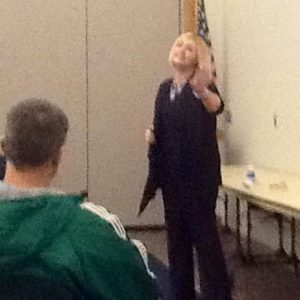You’ve made it past the first hurdle – you’ve started writing! If you’ve been following my posts you either have your own process or now have tools to apply some sense of organization to the chaos. Either way, the book writing journey must be formulated to fit your work habits.

Don’t stop creativity!
One critical part of the process is when you write. During speaking engagements and book signings I’m most frequently asked: “Do you have to write every day at the same time?” And my response usually catches folks off guard: “No, I only write when I’m feeling inspired.”
So many authors have written and spoken about being disciplined in their creativity and setting time aside every day to get some writing done. I suppose that’s a good practice for authors who live off of their published work and have very tight deadlines. For the rest of us, those who have a day job and write for the pure love of the craft, why not enjoy the writing experience to its fullest?
While writing my first book, I only wrote on weekends when I felt the inspiration – which was most of the time. There was only one time when I forced it. I was close to being finished and in a rush. I wasn’t in the mood and I got almost nothing done.
Along the same lines, I don’t force a volume requirement on myself. Some days I’m shocked at the large number of pages I’m able to write – probably never more than twenty or thirty pages in any given day. Other days I’m hard pressed to get five pages written. You can’t assume anything in the creative process!
If you find yourself getting stuck – it probably means you’re trying too hard. Relax, kick back and don’t pressure yourself. Take a break and let your subconscious work on things. If you still can’t get things moving – put your writing away and do something else. Don’t force it!
If you find that this problem does not correct itself over time, re-evaluate your process. Are you editing more than you’re writing? That’s a good way to block your creativity! Once you’re at the point where nothing is happening – over time – I suggest trying this: leave the writing until you’re really yearning for that keyboard, in the meantime let your subconscious work on plot progression – jot notes down so you don’t forget key ideas, then, when you’re really feeling eager, set the perfect stage for your favorite writing environment. For me – out on the deck with a glass of Kim Crawford Sauvignon Blanc is right at the top of the list. Once you’re engineered that perfect creative storm – let yourself go! And don’t sensor yourself – just keep going.
Remember, your work can always be edited later, but don’t stop the flow of creativity. A favorite note from my first editor came at a time when I had mentioned to him that the second book was more difficult to write than the first – as I had heard it would be. When he asked me why I responded that I knew too much about the editing process and couldn’t help but edit as I wrote. He was adamant in cautioning me not to “interrupt the creative process” and he added “that’s our job, you supply the talent and we supply the fine-tuning.” It was the first time I ever really felt that my editors saw me as “the creative talent” and themselves as a tool for my use. That felt good.
Donovan heads Bozell Books, a division of Bozell designed to help authors and budding authors from inception through promotion of their published work. She has authored a novel entitled: Is It Still Murder Even If She Was a Bitch? www.rldonovan.com, and the second in her Donna Leigh Mysteries series is currently being published.



